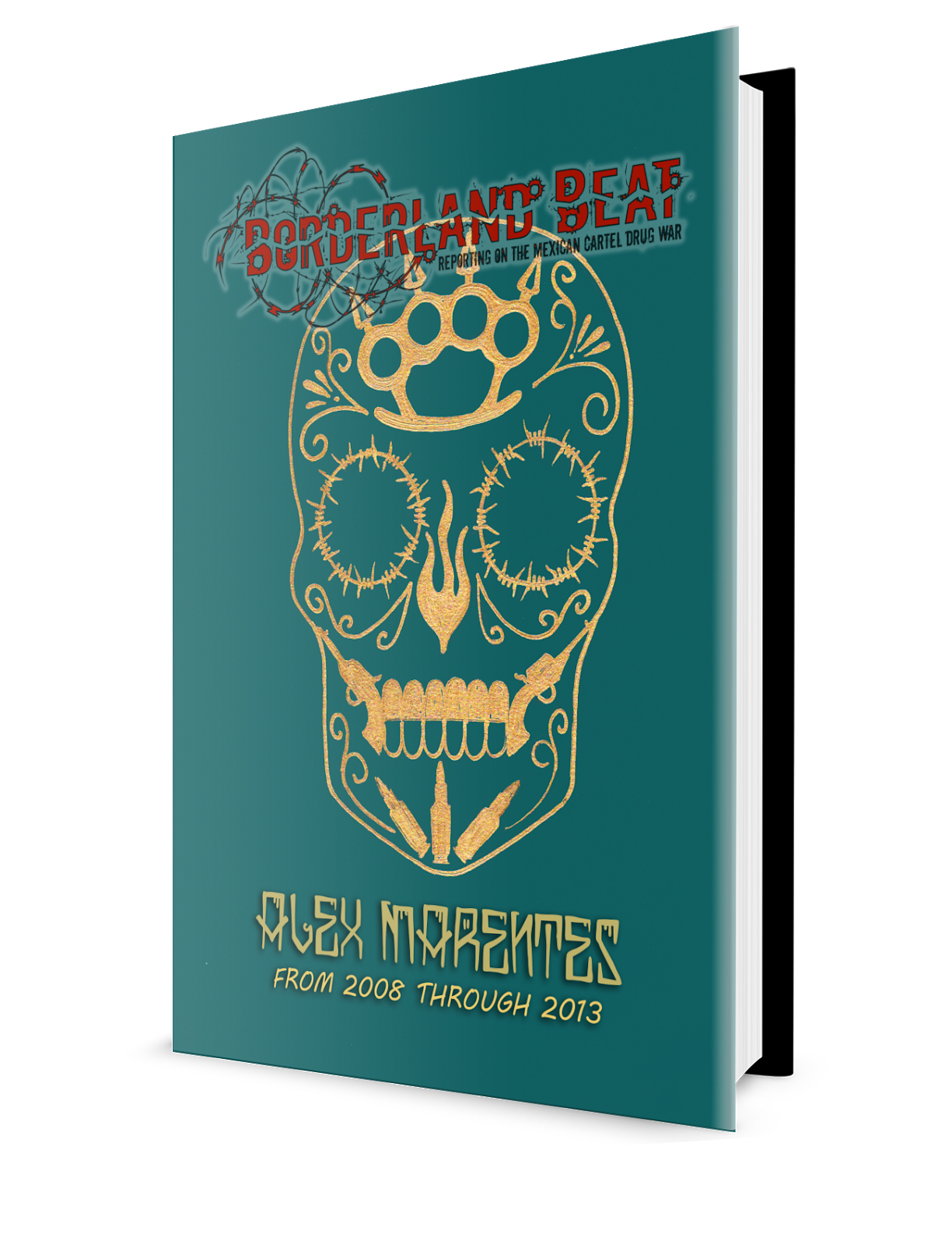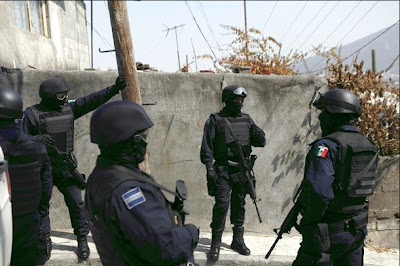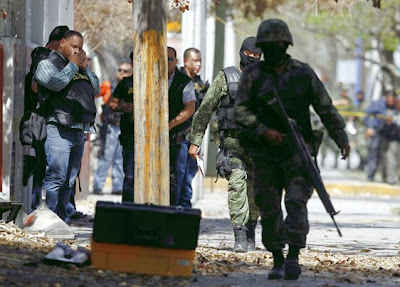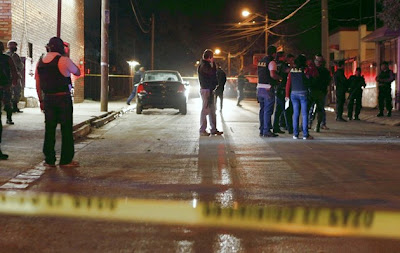Washington Post
'If Monterrey is lost, all is lost'
As Mexico's wealthiest urban area, Monterrey is a symbol of the country's aspirations, with a well-educated workforce, leading universities and a per capita income twice the national average. But the city has also become a front in Mexican President Felipe Calderon's U.S.-backed drug war, and its future is clouded by lawlessness.
Firefighters extinguish burning patrol cars at a police station in the Monterrey suburb of Guadalupe after an attack. January's tally of 144 killings was the highest on record for Monterrey and the surrounding state of Nuevo Leon.
IN MONTERREY, MEXICO When American baseball executives were looking for a place to move the struggling Montreal Expos franchise five years ago, Mexican investors brought them here, to this booming metropolis two hours south of the Texas border.
The case for Monterrey was a strong one then. Business journals ranked the city as Latin America's safest, and hundreds of U.S. companies were setting up operations. Nothing would cement Monterrey's reputation as a world-class city like a Major League Baseball team.
"It would have been a source of pride for all of Mexico," said Roberto Magdaleno, general manager of the local club, the Sultans, as he looked out over his aging ballpark.
Instead, the Montreal Expos moved to Washington and became the Nationals. And the Zetas drug cartel moved to Monterrey and began dumping bodies.
Federal police stand guard at the site of a gunfight in a working-class neighborhood in Monterrey, Mexico. Federal forces conducted an operation early Feb. 22 against organized crime that left three alleged hitmen dead and five more detained, according to local media.
As Mexico's wealthiest urban area, Monterrey is a symbol of the country's aspirations, with a well-educated workforce, leading universities, thousands of U.S. and other foreign business executives, and a per capita income twice the national average. But today the city is at the front of Mexican President Felipe Calderon's U.S.-backed drug war, and its future is clouded by lawlessness. As one top executive here said, "If Monterrey is lost, all is lost."
Until recently, the city's chic shopping plazas and shady streets filled with joggers seemed more like Houston than Ciudad Juarez, the gritty, low-wage manufacturing town along the Texas border that is being depopulated by eight homicides a day. But the same qualities that made Monterrey appealing to investors - good schools, exclusive neighborhoods, upscale restaurants - made it attractive to bosses of the Gulf cartel and its main rival, Los Zetas.
The two mafias are locked in vicious competition at a particularly inopportune time for Monterrey. With the U.S. economy rebounding and labor costs rising in China, the city is poised for another boom. But a surge in violence is putting the economy at risk.
"It could be devastating for Monterrey's international image," said Jesus Cantu, a professor at the Tecnologico de Monterrey, Mexico's top university.
A forensic team inspects a bullet-riddled truck at a crime scene in the municipality of San Nicolas de los Garza, a suburb of Monterrey. Homicides in Monterrey and the surrounding state of Nuevo Leon more than tripled in 2010, to 828, according to state prosecutors.
Homicides in the city and the surrounding state of Nuevo Leon more than tripled last year, to 828, state prosecutors said, and January's tally of 144 killings was the highest on record.
Last month, the 60-year-old security chief of the local prison was snatched from his home, and his butchered remains turned up in a cardboard box. Ten days later, the corpse of the state's top intelligence official was found in a burned-out car, one of more than a dozen police officers slain this year. In the past week and a half, assailants have attacked five Monterrey area police stations with grenades and automatic weapons.
Municipal police officers wait in line for a drug test at police headquarters in Guadalupe, a suburb of Monterrey. Top state officials say they have a comprehensive plan to boost social spending, reform the judicial system and purge the police of corrupt officers. Salaries for starting officers will be nearly doubled, from roughly $600 a month to $1,100 a month, Lt. Gov. Javier Trevino said.
Motorists travel in fear of having their cars commandeered for impromptu roadblocks set up by grenade-throwing gangsters. Gunmen stormed a seafood restaurant in a middle-class neighborhood Feb. 16 and held patrons hostage, robbing and beating them, then stripping and sexually assaulting several women.
"The city has changed," said Carlos Miguel, a 42-year-old accountant shelling out $120 to buy his wife a 5,000-volt stun gun at a kiosk in a mall. "We don't go out at night anymore."
Soldiers chat next to the body of a gunman at a crime scene in Garcia, outside Monterrey. Gunmen tried to kill Garcia Mayor Jaime Rodriguez Calderon in a drive-by shooting, but bodyguards repelled the attack, leaving at least three gunmen dead and two detained, according to local media.
Scars amid growth
Local officials insist that Monterrey is not descending into the kind of criminal anarchy that has turned border cities into no-go zones. Despite the grisly headlines, the region added 95,000 jobs last year and pulled in $2.4 billion in foreign investment, a record amount. Construction cranes still sculpt the city's skyline.
Scott Wine, chief executive of Minnesota-based Polaris Industries, stands by his decision to open a 420,000-square-foot factory in Monterrey this year, where his company will manufacture all-terrain vehicles. But when he attended a meeting that Calderon held last month to soothe jittery foreign investors, Wine said, business leaders asked tough questions about security.
"Monterrey is world class in manufacturing, but it needs to be world class in safety again," Wine said.
Soldiers walk past investigative police at a crime scene in the Monterrey suburb of San Nicolas de los Garza, where gunmen killed Luis Cortes Ochoa, former undersecretary of public security of the wealthy municipality of San Pedro Garza, in a drive-by shooting. Business journals once ranked Monterrey as Latin America's safest city.
"We could grow a lot more if we didn't have these security problems," said Juan Ernesto Sandoval, Chamber of Commerce president.
Monterrey's captains of industry have been drawn into the fight. Lorenzo Zambrano, chief executive of cement giant Cemex, assigned his top executives to help the state government carry out its rescue plan. He said leaders let cockroaches into the kitchen. "We have to work together to fight this plague," Zambrano said.
Police stand guard near a police checkpoint after being attacked in Monterrey. The qualities that made Monterrey appealing to foreign investors -- good schools, exclusive neighborhoods, upscale restaurants -- also made it attractive to bosses of the Gulf drug cartel and its main rival, Los Zetas. The two mafias are now locked in a vicious competition.
Calderon said that he will send four additional army battalions to Monterrey and the border region, which Mexican newspapers have taken to calling the "northern front."
Top state officials say they have a comprehensive plan to boost social spending, reform the judicial system and purge the police of corrupt officers. Salaries for starting officers will nearly double, from roughly $600 a month to $1,100, Lt. Governor Javier Trevino said.
"We are facing problems created by many years of social neglect," Trevino said. "But it is no longer possible to live on little islands of security."
In San Pedro Garza Garcia, the Monterrey suburb that is Mexico's richest enclave, Mayor Mauricio Fernandez has tried to do just that, stoking his reputation as a "rudo," one of the tough guys in the pantheon of Mexican wrestling.
"The more prepared you are for war, the less likely you are to be attacked," said Fernandez, a scion of Monterrey wealth whose family made its fortune in paints and plastics. "If you pick a fight with me, you are going to lose."
Fernandez has installed 2,000 security cameras, quadrupled the police force, established neighborhood watches with 1,000 residents and built his own intelligence service in a $65 million bid to "armor plate" the district. "I pay for information, just like the FBI or Scotland Yard," he said.
But Monterrey's affluent are skittish. At the Ferrari dealership, both of the $350,000 cherry-red models on the showroom floor had been bought and paid for, but the owners have been too fearful to pick them up, employees said.
Living with fear
In August, the U.S. consulate ordered its personnel to move their children out of Monterrey after two security guards were slain in a botched kidnapping attempt at an elite school attended by children of consulate staffers.
Nervous Mexican parents now keep their kids at home at night, and concerts by the Jonas Brothers, Bon Jovi and Lady Gaga have been canceled. Even Magdaleno, the baseball executive, said games have been moved up to 7 p.m. so fans can get home early.
The threats became too much for Alejandro Junco, publisher of El Norte, Monterrey's largest newspaper, and the national paper Reforma.
Junco moved his family to Texas after someone dumped a corpse at his ranch, and the Zetas crime syndicate started demanding extortion money from the summer camp run by his daughter. Junco now commutes to Monterrey by private jet, then arrives on the roof of his newspaper offices by helicopter. He says he feels lonely.
"I loved my life here. I wouldn't give it up for anything. But I did. I gave it up," Junco said. "We had trouble before, but nothing like this, nothing."
A representative of the Zetas demanded that Junco take down a Reforma Web site - called the Red Hot Border, Frontera al Rojo Vivo - because the cartel didn't like the comments section. "They said we had 72 hours, or they would blow up our building," Junco said.
The publisher took the site down, then later brought it back, without a comments section.
















animals , shoot and kill on sight
ReplyDeleteNot to try to steer people to another website, but this guy has a pretty good handle on what's going on in and around Monterrey. Lots of good info from someone who's actually there, not in Washington DC like Nick Miroff and William Booth.
ReplyDeletehttp://exiledonline.com/?s=Pancho%20Montana
Look at the Pancho Montana articles.
This reportage suffers from all the usual cliches of US reporting on Mexico and Monterrey...
ReplyDelete'In San Pedro Garza Garcia, the Monterrey suburb that is Mexico's richest enclave, Mayor Mauricio Fernandez has tried to do just that, stoking his reputation as a "rudo," one of the tough guys in the pantheon of Mexican wrestling.'
Would you ever have the US billionaires who have funded the US Right Wing, the Koch brothers, described in such stupid manner as 'rudo wrestlers'? So then why do they describe thug Fernandez in such a manner?
http://en.wikipedia.org/wiki/Koch_family
Or would Chicago or any other US city be described like it was some palace of the US like Monterrey is described as being exceptionalist for Mexico? I mean what about Guadalajara, Mexico City, Leon, Puebla, etc.? Monterrey is not the OZ of Mexico at all.
There are other major cities in the country. And God forbid that Monterrey be actually a Mexican Houston as the article implies! YUCK.
Monterrey is an important city but it is not the center of Mexico nor the center of the Mexican drug war hurricane either. DF is. The US government knows that, the cartels know that... it is just the US media that seems to always get lost in Monterrey like with this fantasy land reporting
i am not looking to buy a house in Monterrey anymore..hope someday the situation improves,,,cause right now it is not too safe , i hear after dark the streets are pretty deserted here lately, a lot of people are living with self imposed curfews..it is a real fukn shame...the cat and mouse tactic is not working...the mice are taking over and running wild..half the cats are in collusion with the narcos, the situation don't look so good
ReplyDeleteBooth is the DF correspondent for the Post. He isn't based in Washington.
ReplyDelete@March 21, 2011 6:19 AM
ReplyDeleteI know what you mean lito, I was hoping maybe one day to own a house there too, it was so peaceful. I LOVE the city its so modern esp with its new skyscrapers and more to come...I feel like that if if Monterrey is lost all of Mexico is lost!! Viva Monterrey!!
That 'guy with the private jet' who lives in Austin Texas is the most powerful media man in Mexico (owner of the Reforma group) and is named Alejandro Junco, Anonymous 4:43PM.
ReplyDeletehttp://www.wilsoncenter.org/index.cfm?topic_id=5949&fuseaction=topics.item&news_id=477978
Pretty much all the rich in Mexico actually are US pawn people... They may well wave the Mexican flag often enough and talk like they all love Mexico too too very much, but in reality they are mainly total puppets of the US elites. It shouldn't really be considered that this man is under any great hardship as he lives in his 'exile' in Austin and can hobnob with other big important people like Michael Dell, etc. See the list of Univ of Texas exes here for people he might well be friends with perhaps, at least at US top social functions...
https://www.texasorangepages.org/125/extraordinaryexes2.asp?cat=bus
yeah the last house i was looking at had some guys who were staying in it and after i finally got to talk to the owner and he quoted me an outrageous price , we figured it out that it really was not for sale and the big sign was just a ruse to cover for the comings and goings in an "empty" house that was being "worked on"....after i seen the pitbulls and met the guys , i realized that i needed to leave it alone , and mind my own business
ReplyDeleteafter that there was strange guys selling on the corner
a couple of months later there was three kids killed on the corner ..and then about ten more guys in the general barrio
i felt pretty dumb ..but lucky
the house is still for sale
what do these people all have in common? other than their wealth, start with M dell
ReplyDeleteI work for a large US company, when we travel across the border we are now required my our corporate office to wear IOKII bullet proof undershirts.
ReplyDeletethe fact that we need bullet proof undershirt was scary enough but when you stop and think about it made sense for the world we now live in. check them out at www.iokii.com